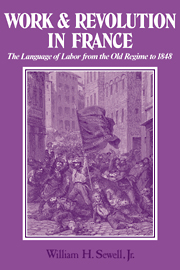Book contents
- Frontmatter
- Contents
- Preface
- 1 INTRODUCTION: SOCIAL HISTORY AND THE LANGUAGE OF LABOR
- 2 MECHANICAL ARTS AND THE CORPORATE IDIOM
- 3 JOURNEYMEN'S BROTHERHOODS
- 4 THE ABOLITION OF PRIVILEGE
- 5 FROM GENS DE MÉTIER TO SANS-CULOTTES
- 6 A REVOLUTION IN PROPERTY
- 7 INDUSTRIAL SOCIETY
- 8 WORKERS' CORPORATIONS
- 9 THE JULY REVOLUTION AND THE EMERGENCE OF CLASS CONSCIOUSNESS
- 10 THE PARADOXES OF LABOR
- 11 THE REVOLUTION OF 1848
- 12 CONCLUSION: THE DIALECTIC OF REVOLUTION
- Notes
- Bibliography
- Index
6 - A REVOLUTION IN PROPERTY
Published online by Cambridge University Press: 06 November 2009
- Frontmatter
- Contents
- Preface
- 1 INTRODUCTION: SOCIAL HISTORY AND THE LANGUAGE OF LABOR
- 2 MECHANICAL ARTS AND THE CORPORATE IDIOM
- 3 JOURNEYMEN'S BROTHERHOODS
- 4 THE ABOLITION OF PRIVILEGE
- 5 FROM GENS DE MÉTIER TO SANS-CULOTTES
- 6 A REVOLUTION IN PROPERTY
- 7 INDUSTRIAL SOCIETY
- 8 WORKERS' CORPORATIONS
- 9 THE JULY REVOLUTION AND THE EMERGENCE OF CLASS CONSCIOUSNESS
- 10 THE PARADOXES OF LABOR
- 11 THE REVOLUTION OF 1848
- 12 CONCLUSION: THE DIALECTIC OF REVOLUTION
- Notes
- Bibliography
- Index
Summary
THE SANS-CULOTTES unique and surprising ideas about property - distinct at once from the conceptions of the old regime, of the National Assembly, of the Jacobins, and of later socialist thinkers - emphasize the fact that conceptions of property were transformed during the French Revolution. The character and significance of property in the social order was far from clear in the early 1790s. Historians have long recognized that property was a crucial issue in the Revolution: After all, the Declaration of the Rights of Man and Citizen raised property to the dignity of a “natural and imprescriptible right of man.” For both liberal and Marxist historians, one of the Revolution's great accomplishments was to free citizens from the entanglements, vexations, and constraints that had limited their free enjoyment of property under the old regime. Liberals and Marxists have disagreed, of course, as to how this freeing of property should be interpreted: as a triumph of liberty or as the crucial act of a bourgeois revolution that would itself be transcended in a proletarian revolution. But most historians have been content with the notion - which was that of the National Assembly itself- that the Revolution unfettered property from sundry archaic or “feudal” constraints. Few have recognized to what extent this “liberation” was actually a radical redefinition of the very nature of property, nor have they recognized how long it took for the outlines and consequences of this new system of property to become clear in practice.
- Type
- Chapter
- Information
- Work and Revolution in FranceThe Language of Labor from the Old Regime to 1848, pp. 114 - 142Publisher: Cambridge University PressPrint publication year: 1980
- 1
- Cited by



